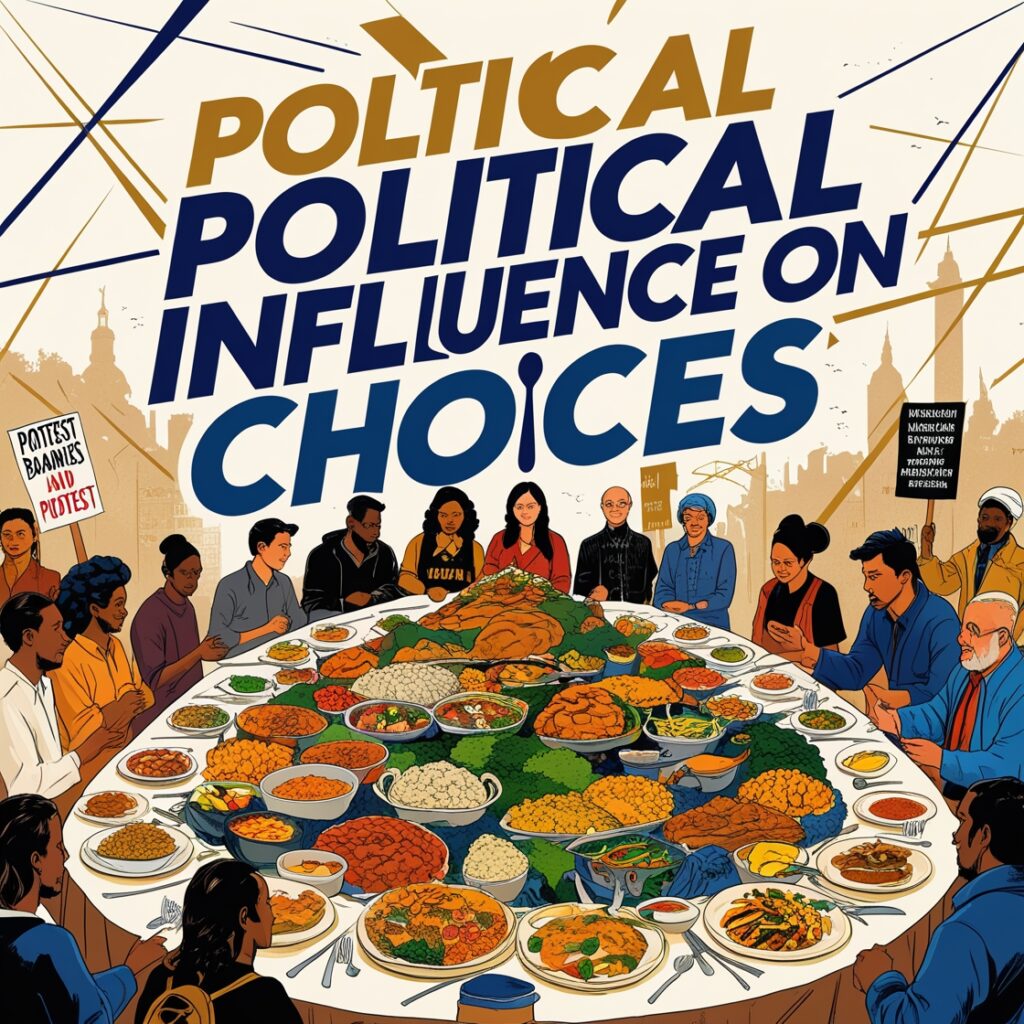Political influence on food choices

What we choose to eat is often a reflection of our political beliefs. In this article, we’ll explore how the government influences our food choices and discuss some of the controversial topics surrounding food and politics.
The effect of the political landscape on food choices
The current political landscape has a significant impact on food choices. With the rise of populism and nationalism, there has been an increased focus on local food production and consumption. This has led to a resurgence in traditional foods and a move away from processed and imported foods.
Several factors have contributed to this trend. One is the growing suspicion of global food chains and large-scale agriculture’s negative environmental and social impacts. Another is the desire to support local farmers and businesses. And finally, there is the belief that eating locally produced food is healthier and more sustainable.
Whatever the reasons, it is clear that the political landscape has a major influence on food choices. As we head into an uncertain future, this trend will likely continue.
How political turmoil affects the food industry
The food industry is one of the most heavily regulated industries in the United States. The government greatly influences what foods are available to consumers and how they are produced. Political turmoil can have a major impact on the food industry in the short and long term.
In the short term, political turmoil can lead to disruptions in the supply chain. For example, if there is a trade war between the United States and another country, it could lead to tariffs being placed on imported food products. This would make them more expensive for consumers and lead to shortages of certain items.
In the long term, political turmoil can majorly impact food policy. For example, if a new administration comes into power that is hostile to environmental regulations, it could roll back policies that are designed to promote sustainable agriculture. This could have a major impact on the foods available to consumers in the future.
The role of the government in dictating food choices
The government plays a significant role in what we eat. They do this through food subsidies, marketing campaigns, and food industry regulations. Some people think the government should do more to influence our food choices for public health, while others believe that such interference violates our right to freedom of choice.
The impact of politics on dietary habits
The average person doesn’t give much thought to the politics of food. But the reality is that what we eat is heavily influenced by the decisions made by our government officials. From the subsidies that keep certain crops cheap to the trade deals that dictate what’s imported and exported to the regulations around food safety, politics play a big role in what ends up on our plates.
Depending on your point of view, this can be a good or bad thing. Some people believe that the government should use its power to encourage healthy eating habits, while others believe that individuals should be free to make their own choices about what they eat.
There are valid arguments on both sides, but one thing is clear: the decisions made by our politicians have a profound impact on our dietary habits. So next time you’re sitting down to a meal, take a moment to think about how politics has influenced what’s on your plate.
The interplay between food and politics
The food we eat is deeply intertwined with the political choices we make. What we put on our plates reflects our values and beliefs. For some, food is simply a way to nourish the body. But for others, it is a statement about who we are and what we stand for.
The politics of food can be seen in everything from how our food is produced to how it is marketed and sold. It even extends to how we think about food and our eating habits.
There is no one-size-fits-all approach to the politics of food. We all have different opinions on the subject, and our personal experiences often shape these opinions. But some common themes emerge when we talk about the politics of food.
For example, many people are concerned about how our food is produced. They worry about pesticides and other chemicals in agriculture and want to see more organic and sustainable farming practices.
Others are concerned about the way our food is marketed and sold. They believe unhealthy foods are being pushed on children through marketing techniques that exploit their vulnerability. And they want to see stricter regulation of the food industry to
Conclusion
The food we eat is political. Our decisions about what to put on our plates are influenced by a complex web of factors, including our personal beliefs, cultural background, and the current political climate. When the world is more divided than ever, it’s important to know how our food choices can impact the larger picture. By making conscious decisions about what we eat, we can use our food choices as a tool for positive change.


